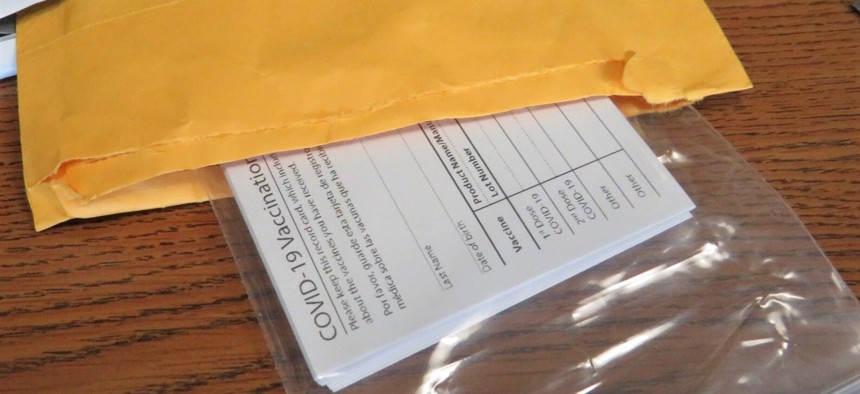
CBP photo
DHS Officers 'On the Lookout' for Fake COVID-19 Vaccine Cards After Seizing Thousands in Recent Weeks
Local offices are pooling information and remaining on high-alert amid surge in counterfeit cards coming from overseas.
The Homeland Security Department is instructing its screeners to keep special watch for counterfeit COVID-19 vaccination cards after a recent influx at U.S. ports.
Customs and Border Protection officers have seized 7,000 fake cards imitating those produced by the Centers for Disease Control and Prevention, an agency official said, including 3,000 this week in Anchorage, Alaska. CBP’s Office of Intelligence has monitored the development and sent instructions to the field to keep an eye out for the counterfeits, where officers rely on manual searches and technology such as x-rays to identify suspicious materials.
“We were on the lookout because we knew it was just a matter of time,” said Jaime Ruiz, a CBP spokesman. He explained the agency’s officers have intercepted improper personal protective equipment and fake vaccines for months, meaning officers were already on high alert.
The counterfeit vaccine cards have come from China through private shippers, such as FedEx, DHL and UPS. Those shipments would likely take two-to-three weeks to arrive if sent through the U.S. Postal Service, Ruiz said, and the current trend tracks with recent history when shippers of “hot products” instead opt for express options. All private sector international packages go through a screening as they are processed through customs.
In addition to Anchorage, CBP screeners have seen a spike of fake cards in Memphis. All packages go through an x-ray and officers pull those that look suspicious or anomalous. Shortly after the Sept. 11 attacks, Congress required all packages sent through private shippers to include “advanced electronic data” that provides information on their contents. If an international item is labeled as containing shoes but an x-ray does not display shoes, Ruiz said as an example, it would trigger an action by CBP.
In the case of the counterfeit vaccine cards, screeners noted a series of small envelopes all from the same sender going out to a wide number of locations across the country. Each envelope contained between 30 and a few hundred of the cards. Typically, seized items would include synthetic drugs, counterfeit goods and other illicit materials, but screeners have noted a shift since the outset of the pandemic.
“Getting these fraudulent cards off the streets and out of the hands of those who would then sell them is important for the safety of the American public,” said Lance Robinson, director of the Area Port of Anchorage. “Looking out for the welfare of our fellow Alaskans is one of the many and varied responsibilities CBP is proud to take on.”
CBP, through its intelligence office, coordinates the sharing of information obtained on the ground from across the country. That effort is heightened when there is new demand for a product, as created by the recent uptick in vaccine mandates to go to restaurants, attend concerts or continue working.
“We’re always looking for new trends,” Ruiz said.
Ruiz noted the FBI and Homeland Security Investigations will now take charge in moving forward with the cases, including potential prosecutions. The FBI reminded the public this week not to use fake vaccine cards, saying in a statement it both endangers the public and is a federal crime.
“We don’t have a whole lot of information, we just want to raise the alarm,” Ruiz said. “Someone, somewhere is trying to make a profit.”







